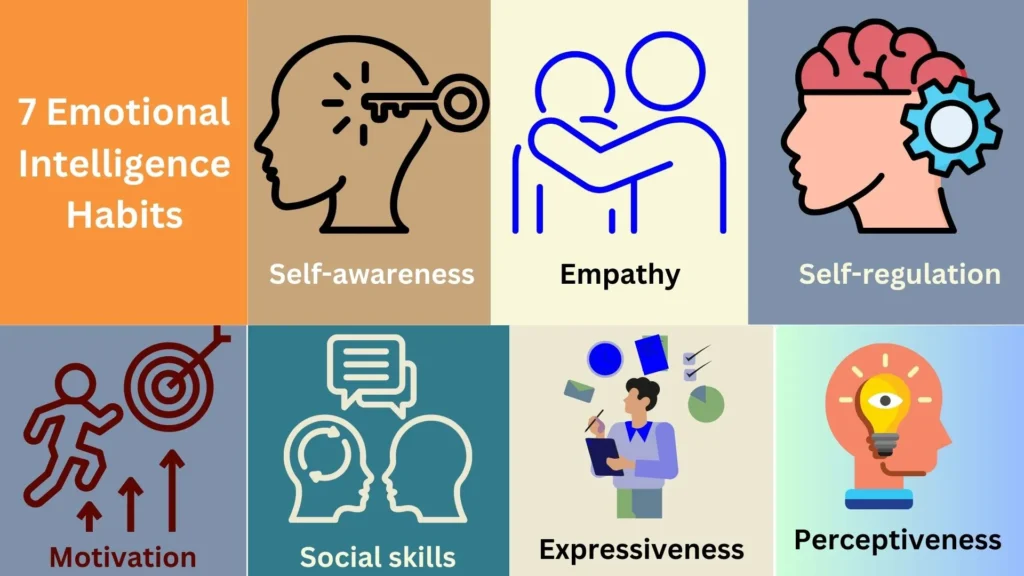In order to be accurate and exact in your decisions, you should develop emotional intelligence habits.Emotional intelligence defines our professional relationships, interpersonal communications, and ability to motivate ourselves.
“Anyone can become angry—that is easy. But to be angry with the right person, to the right degree, at the right time, for the right purpose, and in the right way—that is not easy.”
Do you know how many habits are there to develop emotional intelligence? Emotionally intelligent people follow different seven habits. Continue reading here if you want to become emotionally intelligent.
Table of Contents
What is Emotional Intelligence?
Emotions and intelligence are two different terms, but they are interrelated. Many people have presented their views about emotional intelligence. Some of the major definitions are
- Emotional intelligence is the ability to control your emotions and respond to others’ emotions effectively.
- Emotional intelligence (EI) is the ability to convey, express and communicate your emotions without being negatively influenced by others’ emotions.
- Emotional intelligence is the ability to identify and manage one’s own emotions as well as the emotions of others.
- It is a type of intelligence that involves the ability to process emotional information and use it in reasoning and other cognitive activities. American Psychological Association, 2018.
In simple words, EI is a person’s control of his emotions.
Origin of Emotional Intelligence
The concept of emotional intelligence first appeared in 1990. This theory was put forward by Peter Slovey and John D. Mayer but popularized by Daniel Goleman. Some psychologists and researchers argue that emotional intelligence is also called emotional quotient EQ. However, EQ does not hold a true explanatory power.
What are the Skills of Emotional Intelligence?
Emotional intelligence is as important as the emotions of a person. As long as you have emotions, you need to master and strengthen emotional intelligence. According to Mayer and Slovey, there are four skills in EI. These skills are
I. The Capability to Perceive Emotions
Perception of emotions is a vital skill in EI. It is the ability to feel your emotions and the emotions of others. Every action or idea starts with these skills, especially emotional intelligence. If you have strong power and hold on perceiving and feeling emotions, you have mastered the first skill.
II. The Ability to Reason with Emotions
Emotions and reason are two different things. You can either act on emotions or reason at a time. However, emotionally intelligent people use both of them. They always try to find a reason to trigger their emotions. They view that if you can identify the reason, you can control emotions.
III. Understanding emotions
Feeling the emotions of others is really important. First, know your own emotions and then feel others’. It makes you understand how others are feeling. It also helps us understand our relationship with others.
IV. Managing emotions
One of the major benefits of Emotional intelligence is that it shows you how to control and manage emotions. It instils the ability to ignore or dismiss unproductive and useless emotions.
7 Emotional Intelligence Habits
The following are the 7 high habits of emotionally intelligent people.

1. Self-awareness
Self-awareness is the ability to recognize emotions, feelings and moods. It is your conscious knowledge of mind, character and desires.
Self-awareness makes you able to perceive and understand the things that make you know who you are as an individual, including your personality, values, beliefs, actions and emotions.
According to Goleman, self-awareness is one of the significant emotional intelligence habits. Being part of self-awareness means that it is your job to identify the influence of your emotions on others. It is the basic component of EI to monitor your actions and states in comparison to others.
Mindfulness and a thorough reflection on your actions are the ways to identify your actions. Think about your actions and reactions in the last part of the day before sleeping. Recognize how you responded to others and then plan a strategy for the future.
Self-awareness is self-assessment. Assess your strengths and weaknesses. Work on the weakness to improve yourself. Self-assessment is also one of the habits of successful insurance agents.
2. Empathy
Empathy is a unique quality and the best habit of emotionally intelligent people. It is the ability to understand and share the feelings of another. I asked my teacher what empathy is, and he defines it as the ability to put yourself in another body place. It means to give value to others’ feelings and emotions.
Empathy is a unique habit as it allows you to understand and feel what others feel, see things from their perspective and imagine yourself in their place.
The habit of Empathy is very necessary and helpful in workplaces. It helps you understand or feel what others’ emotions are. What are their grievances and feelings?
For example, if a servant is upset, you can easily understand what he is feeling. It will develop your ability to respond appropriately.
3. Self-regulation
Self-regulation is organizing yourself without intervention from external bodies or objects. It is to control and regulate your emotions, behaviours and actions by yourself. How well we regulate, control and monitor our own emotions or feelings.
Recognize your emotions and then apply the knowledge to improve yourself. One of the habits of emotionally intelligent people is that they think before they act on anything or their feelings. They are the masters of their emotions.
Self-regulation helps you rule your emotions and shape your life according to your own choices. Don’t let emotions rule you; instead, be the king of yourself.
4. Motivation
Motivation is the most common habit of emotional intelligence. It is motivation that keeps you on track to achieve your goals.
As you know, there are two types of motivation. Intrinsic and extrinsic. Extrinsic motivation is sometimes required in the form of guidance or a mentor. But the most important is intrinsic motivation.
Emotionally intelligent people are internally motivated. They rely less on external factors; hence, they believe in self-regulation. They are able to control their emotions and behaviour to achieve long-term success.
It is the motivation that helps us continue to struggle and the journey to our goals instead of hardships. Motivation is vital in emotional intelligence because, without it, you will not be able to gain self-control.
5. Social skills
Social skills are an important emotional intelligence habits. EI is all about caring for others or feeling others’ feelings. Emotionally intelligent people have strong social skills as they are accustomed to the feelings of others.
They are socially intelligent. They are aware of the people and society around them and how to effectively communicate and relate to them.
Social isolation can lead you to employee disengagement.
6. Expressiveness
Understanding one’s feelings is easy, but sharing your emotions with others is difficult. Some people are good but cannot express their own emotions. Emotionally intelligent people have the best ability to express themselves. They know how to show and express feelings.
The expression of emotions is a highly difficult task because it is not just about expressing them but also about expressing them appropriately. It means that you should be able to respond in such a way so as not to harm others.
For example, you could have scored better on a paper. After coming home, you lock yourself in a room and don’t even want to talk to others.
There are better ways than this. As an emotionally intelligent person, you have to express your feelings and complaints to your parents or teachers. They can guide you best. Consult with them and prepare for the next paper.
Expressiveness is also one of the studio habits of mind.
7. Perceptiveness
Perceptiveness is the ability to understand and notice people or things the way other people do not notice. One of the habits of emotional intelligence is to discern or exhibit keen observation.
Emotionally intelligent people are able to identify the source of their feelings. Perceptiveness teaches you how to cope with others in any unwanted situation.
For example, if your coworker does something wrong, think about your position. How would you feel if you did the same?
Please don’t be angry with others; they have the same pressure and angst as you.
How do You Become Emotionally Intelligent?
Emotional intelligence can be learned just like other habits. The method is simple and easy. If you don’t know how to improve emotional intelligence, then ask yourself some questions.
- How do my actions, behaviour, and emotions impact others?
- What is the result of my actions?
- How do your emotions and feelings affect your values and beliefs?
The foundation of emotional intelligence is to know how you think and feel and how your emotions affect others.
It is believed that mindfulness and cognitive behavioural therapy are techniques to become emotionally intelligent. Cognitive behavioural therapy is a type of therapy in which a therapist guides people on how to regulate emotions. He teaches healthy coping mechanisms and ways to handle people and be good at relationships.
Additionally, there are social and emotional learning programs that can be used to equip young learners as well as community individuals with emotional intelligence knowledge. SEL programs help adults learn emotional intelligence habits.
How do We Improve Emotional Intelligence?
Emotional intelligence always needs to be improved. There are several ways. Some of them are discussed above, while the rest are given as
- Listen to your emotions. Please read them carefully and find an effective solution. If you ignore your emotions, they will dominate you, hence leading to less control of yourself.
- Assessment of emotions is also necessary. Analyze your responses and identify the triggers that make you lose interest. Evaluate your progress and emotions.
- Practice empathy with other people. place yourself in others’ positions and then define your emotions. This is the best way to realize others’ feelings and improve your own.
Ways to know if I am emotionally intelligent
If your answer is “yes” to the following questions, you are emotionally intelligent.
- Do you have the ability to accept and embrace change?
- Are you aware of your strengths and weaknesses?
- Are you able to learn from mistakes and ignore them in future?
- Do you have a strong curiosity?
- Do you have feelings of empathy for others?
- Are you sensitive to others’ feelings?
- Can you handle and manage emotions in hard times?
Search for the answers to these questions if you don’t know and improve your emotional intelligence.
Conclusion
Emotional intelligence habits are the basics of personal development. They help you realize your emotions and empathize with others. Emotional intelligence teaches you how to control emotions.
Emotions can be controlled through four main skills: perceiving, reasoning, understanding, and identifying emotions. These skills not only help you control emotions but also how to effectively use them.
The seven habits of emotionally intelligent people are a light for all those who want to dominate their emotions. Express your emotions when required, but the most important is to feel others’ emotions as well. Empathize with people to help them and feel their pain.
Self-awareness and regulation are at the heart of emotional intelligence, which gives you motivation and the ability to cope with obstacles. Improve your EI with the help of these habits and be a better version of yourself.
FAQs
What is an emotional intelligence test?
An emotional intelligence test is a criterion for determining your level of emotional intelligence. It works on the answers that you provide for different questions. This test analyzes your response and decides how emotionally strong you are.
What are emotions, and what is intelligence?
Emotions are complex psychological states that involve subjective experience, while intelligence is the ability to acquire and apply knowledge and skills. Emotional intelligence is the ability to identify, assess, and control the emotions of others or yourself.




